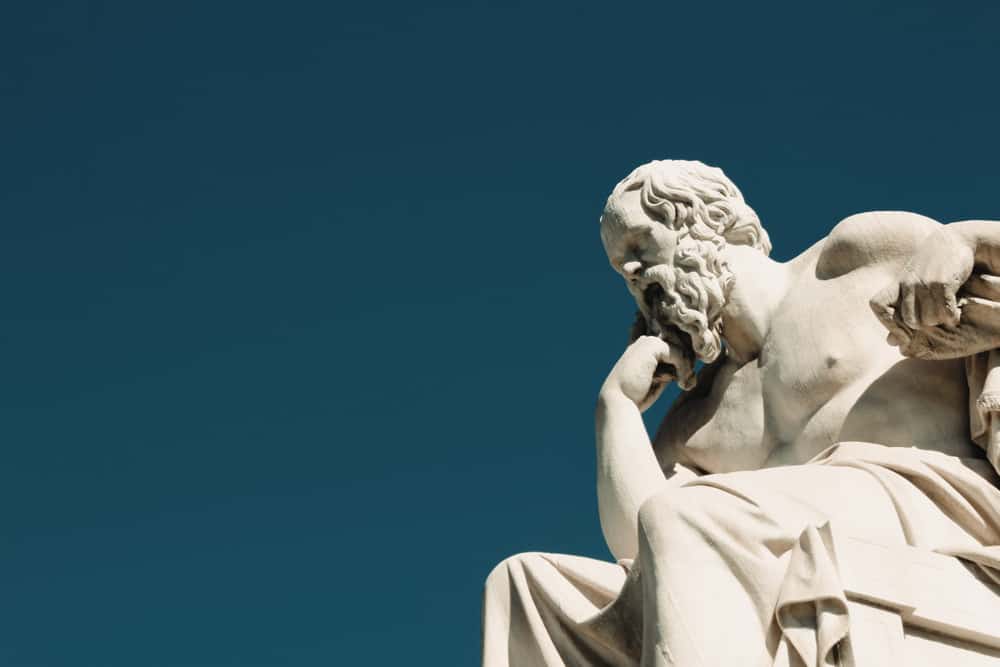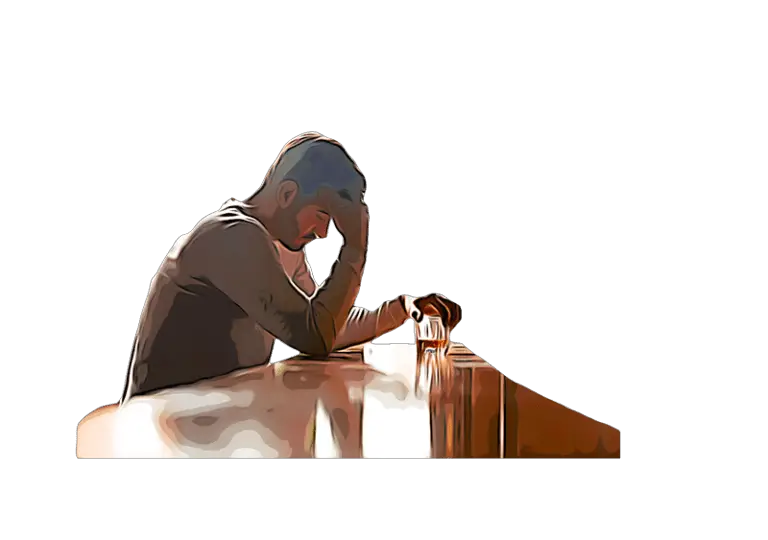12 Characteristics of a virtuous person
If you asked 100 people this question:
What kind of man would you want your son to become?
I doubt that people would talk about their son’s future job, sexual orientation or how he takes his coffee.
My guess is that people would talk about his virtues. His character. What he stands for.
And wouldn’t those virtues be all of those qualities that we ourselves want to embody? We all know a virtuous person when we see one. Their example inspires us to become stronger versions of ourselves. But what exactly are we talking about when we talk about being virtuous?
This article will explain the 12 characteristics of a virtuous person. Use this list as a roadmap for your own character, and the rest of the world will benefit.
- A Virtuous person tells the truth
- A virtuous person listens to others
- A virtuous person gives for the sake of giving
- A Virtuous person does not judge others
- A virtuous person works to justify their privilege
- A virtuous person keeps their house in order
- A virtuous person can be relied on by their friends and family
- A virtuous person can be genuinely happy for others’ successes
- A virtuous person has empathy for the suffering of others
- A virtuous person is patient
- A virtuous person lets their actions speak
- A virtuous person takes it upon them self to be a force for good.
Read also: Too cheap for therapy? Read these books!
A Virtuous person tells the truth
We’ve all heard it since we were kids.
Always tell the truth.
But why exactly? What is it about telling the truth all the time that is so crucial? I’ve done some research, and put together 3 explanations for why telling the truth might be the most important virtue of them all.
1. You can’t operate properly in the world if you can’t trust yourself
Living a fulfilling life in this world isn’t easy. It requires taking risks, pushing through adversity, sacrificing short term pleasure and overcoming randomly allocated tragedy. It’s no walk in the park!
If you speak the truth and try to do what you consider to be the right thing wherever possible, then at least you can trust in your own integrity. It is a solid rock on which to stand, and sometimes in life, it is the only thing we have to defend ourselves. You lose that self-respect at your own risk.
2. You can’t have a real relationship without truth
Sharing your truth with someone is sharing how you think and feel about the world. It makes you feel vulnerable and exposed, but it also empowers that person to do the same with you. You both learn some genuine truth about one another, and your own perspective is enriched as a result.
This is the essence of a genuine relationship.
If you are dishonest with your partner, and what you think is different from what you say, do they actually know you? Have they ever actually met you? No one wants a relationship like that. It would be absolutely exhausting.
3. Lying empowers insecurity and more lying
Think about it.
Why lie anyway?
When it comes down to it, we usually lie because we don’t want other people to know some uncomfortable truth. We want to conceal something so that other people perceive us differently.
If you cared more about your opinion of yourself than other peoples opinion of you, there would be no incentive to lie in the first place.
I’m not saying anyone is completely secure in themselves. We all have that temptation to hide the truth on occasion. But by listening to that voice, You make it louder. And you make it easier to listen to in the future. It is easy to start a spiral into deeper lies and insecurity.
A virtuous person listens to others
If you think of all the knowledge that could possibly exist, you could only possibly know a tiny percentage of all the knowledge that there is to know. The world is just too big!
You might know more than others. You might be the smartest person in the room. But think about it.
There are alot of other rooms. There are alot of smart people.
Even the absolute smartest person can only have gathered so much knowledge. Even he wouldn’t know something that you or I could teach them!
What I am getting at is that there is a complete abundance of knowledge in the world, and you can use knowledge to improve your life and the world itself. But there is a shortage, and the shortage is your own ability to gather information. You limit your own learning.
When you swallow pride and assume that the people you talk to have something to teach you, you can actually learn from them. What they know, can now be added to what you know.
Humans are not perfect sources of information. You should question what people tell you, and be careful not to take opinion as fact. But there will be something in there of value! Imperfect information beats no information every time!
This virtue also benefits other people vastly. When you listen to people, people feel listened to. I know! Go figure!
A virtuous person gives for the sake of giving
When you give your time or money to some positive cause, do you do it for your own personal gain? Or do you do it because it is the right thing to do?
A hallmark of the virtuous is that they have the ability to look beyond their own immediate needs and desires, and genuinely concern themselves with the well-being of others.
A subtle distinction should be made here between giving and getting good things in return, vs giving to get good things in return.
Often charitable and generous people receive all kinds of help and resources from others, and can lead to massive financial growth and career development. But they dont give for all of those gifts that come back their way.
They give because of their beliefs about giving itself.
“For it is in the giving that we receive”
St Francis of Assisi
A virtuous person does not judge others
“Judging someone does not define who they are. It defines who you are”
What on earth do you know about other people’s lives? Everyone has things they struggle with. Everyone has genetic strengths and weaknesses. We all have things about our lives that we don’t share with the people we meet.
That being the case, who do you really actually know? If you meet someone and spend a few days or months with them and witness a few of their actions, are you really in a position to actually grasp what they’re like?
With such a limited perspective on the people we meet and the world we live in, it seems only appropriate to operate with humility and without judgment.
In researching this article, I came across this short clip by Jay Shetty explaining why judging others is so counterintuitive:
There is one further point about judging others that I found powerful. Time is scarce, and so time that you spend criticizing someone else’s character or actions is time that you have not spent improving yourself or taking action in your own life. It’s never the right move.
“Judging others is easy because it distracts us from the responsibility of judging ourselves.”
A virtuous person works to justify their privilege
Our modern society is full of talk about privilege. Whilst a genuine problem that affects really everyone in the world, the solution to this issue is complex.
If everyone is so different in race, gender, background, IQ, family environment, etc etc- it is clear that some people do have it relatively harder than others.
If you are an American white man with a stable family upbringing, you might find it easier to succeed in your career than some other American white man.
If you are an American white man, you might find it easier to succeed in your career than some other white man.
If you are a white man, you might find it easier to succeed in your career than a white woman.
If you are a white woman, you might find it easier to succeed in your career than a black woman.
If you are a black woman, you might find it easier to succeed in your career than a woman who is trans.
If you are a trans woman in America, you might find it easier to succeed in your career than a woman who is trans in russia.
If you are a trans woman in Russia, you might find it easier to succeed in your career than any woman in Afghanistan.
You also might not. Because who knows how things will play out, and what hand specific people are dealt. It’s an incredibly complicated issue. What is the solution?
Whatever level of privilege someone has, if they are a virtuous person they will strive to justify their privilege. What you have and have not been given is completely out of your hands. It’s not like anyone with privilege or struggle asked for it. All that any of us can do, really, is to try to use our work to leave the world slightly better than we found it. That is a challenge that exists for everyone, regardless of predetermined levels of privilege.
A virtuous person keeps their house in order
It’s one of those old sayings for a reason. To get your own house in order is to work on fixing yourself and your own environment. This process can be physical, mental, financial, spiritual- really every part of your life can be better with enough consistent effort.
Focusing on getting your own house in order isn’t just an act of self improvement, but of humility. When you are struggling wholeheartedly to make your own self better, what you are not doing is looking around you at all of the horrible things going on in the world.
You are staying in your own lane, working to change what it is that you can change.
This attitude of personal responsibility is great because when you experience firsthand just how difficult it is to improve even small things about yourself, you will become more empathetic and understanding about the shortcomings of others.
“He that is without sin among you, let him cast the first stone”
The clip below shows psychologist Jordan peterson discussing this attitude in relation to the mindset of mass murderers. I found it both educational and cautionary, and it made me question my own attitude towards the world:
A virtuous person can be relied on by their friends and family
A little while ago, I was a chef trying to build a career in london. I was saving all my money, cooking in all these brilliant kitchens, and really doing nothing much besides working. I was focused.
My heart started having these long palpitations, and to cut a long story short I felt rough and decided to go to the doctor to get checked out. It turned out that I was in serious trouble, and my resting heart rate was 220 beats per minute. I was rushed to hospital to sign some forms, and have an operation to remove a rogue electric pathway that they found in my heart.
I essentially had 2 days of being quite close to dying. (I didn’t. I’m good now). Before that , 98% of my thoughts and actions were related to cooking, food, money, investing etc. That was really all I cared about.
During those 2 days, that all seemed so pointless. All I could think about was my health, my family and my friends. That was all there was.
Why?
It seems to me, because fundamentally that is what truly matters. All the rest, ultimately, is just stuff to do.
As I’m sure many people have experienced, I soon recovered and quickly got back to thinking selfishly and materially most of the time! But remember why you do what you do. Remember who you want to be glad they know you.
And whilst you’re pushing yourself towards your own goals, don’t lose sight of who it is you need to be there for when required.
“I would rather walk with a friend in the dark, than alone in the light”
Helen Keller
“To ease another’s heartache is to forget one’s own”
Abraham Lincoln
A virtuous person can be genuinely happy for other people’s successes
When you tell a person about some great thing that has happened to you, regardless of what they actually say, their mind can go one of two ways.
If this person was of virtue, they would be genuinely happy for your success. If they were not of virtue, they would be envious or bitter about it. Why?
The virtuous person has an abundance mindset. A belief in abundance is a belief in infinite possibility! You can succeed, and I can succeed, and your success in no way affects my success. There are more than enough opportunities in this world, and You never know what great opportunities might be presented to you.
The person without virtue sees the world as scarce. There is only so much to go around, and there are only so many great opportunities. When you succeed, that in some way says something negative about me or my own chances of success. You can see how this mindset can be used to justify a lot of petty tribalistic thinking and really negative behavior in society.
A virtuous person has empathy for the suffering of others
Check out this short film about the power of empathy by Dr Brene Brown:
I’m sure we’ve all experienced how brutally hard life can be. It’s like the privilege point in reverse- we’ve all been in awful situations, and no matter who you are, there are people among us who have seen even more awful situations. Life is suffering.
What is the appropriate response in a world like this?
If you are a person of virtue, when someone suffers greatly, you can feel their pain. You can understand their suffering, and maybe in a small way suffer along with them.
Because when you suffer with someone, they are not alone in their experience. They have support that although doesn’t fix things, certainly improves things.
“When we honestly ask ourselves which person in our life means the most to us, we often find that it is those who, instead of giving advice, solutions, or cures, have chosen rather to share our pain and touch our wounds with a warm and tender hand. The friend who can be silent with us in a moment of despair or confusion, who can stay with us in an hour of grief and bereavement, who can tolerate not knowing, not curing, not healing and face with us the reality of our powerlessness, that is a friend who cares.”
Henri J.M. Nouwen
A virtuous person is patient
“Patience is not the ability to wait, but the ability to keep a good attitude whilst waiting”
Short term thinking is everywhere these days. Social media has wrecked our attention spans, and seeing everyone’s highlight reel instagram feeds has given us the impression that we should all be successful with it all figured out at 30 or 25 or 20.
Unfortunately, anything meaningful takes time. Whether we’re talking about cultivating relationships, building wealth, organizing a family or creating something of real value; we’re usually talking about years of work rather than months of work.
Not only is patience a virtue and an admirable character trait, but it is also one of the most valuable traits that you can use in the working world and in business.
“Our patience will achieve more than our force”
Edmund Burke
“The two most powerful warriors are patience and time”
Leo Tolstoy
“Most people overestimate what they can do in one year and underestimate what they can do in ten years.”Bill Gates
A virtuous person lets their actions speak
It’s easy to talk about what you can do, what you will do, what will happen. We can all do that, and we do all do that.
What’s harder is living up to your own words. Acting out your own ambition. Following through on your commitments. A person of virtue knows this, and so they make sure their actions match what they say they are going to do.
It isn’t like everyone who talks big is trying to deceive you. Most of us have good intentions in setting ambitious goals and planning positive acts. It’s just that often things are significantly more complicated than they seem. Everything seems pretty straightforward until you go to do it.
Let your actions speak. Work to over deliver on your promises. In life, you will gain a rock solid reputation as someone to count on. In business, you will gain loyal customers and feel grateful for your product or services. When interacting in general, you will leave a positive taste in everyone’s mouth.
“People may doubt what you say but they will believe what you do”
“It is much easier to propose than to execute”
A virtuous person takes it upon themselves to be a force for good
We all have this limited control over the world and our lives. We all have our own problems and shortcomings and desires, and at the same time there is all of this suffering and malevolence going on around us. There is a situation that could be fixed, everywhere that you look.
The person of virtue will take it upon themselves to leave the world in a better state than they found it.
This is not about trying to fix everything. 1000 goals is the same as 0 goals, and so you can’t just do everything that you want. But whatever a virtuous person’s aims are, they are in line with good in the world. They know that what they do matters, and they focus on bringing value and growth into their environment.
A person of virtue is a genuine force for good.
Other great resources for learning about virtues
If I had to pick 1 book that I have read that is most relevant and applicable to becoming a more virtuous person, it would be Road to character by David brooks.
This is a brilliantly written book about developing your own character. It is full of wise insights into how we all want to behave in our soul. Here are a few ideas from the book that spoke to me.
“Self-respect is not the same as self-confidence or self-esteem. Self-respect is not based on IQ or any of the mental or physical gifts that help get you into a competitive college. It is not comparative. It is not earned by being better than other people at something. It is earned by being better than you used to be, by being dependable in times of testing, straight in times of temptation. It emerges in one who is morally dependable. Self-respect is produced by inner triumphs, not external ones.”
“Moral improvement occurs most reliably when the heart is warmed, when we come into contact with people we admire and love and we consciously and unconsciously bend our lives to mimic theirs.”
“When you have deep friendships with good people, you copy and then absorb some of their best traits. When you love a person deeply, you want to serve them and earn their regard. When you experience great art, you widen your repertoire of emotions. Through devotion to some cause, you elevate your desires and organize your energies.”
You can click here to check out the book on amazon
Enjoyed this article? Check out some of our others:
Mental Strength Vs Physical Strength: an in depth comparison






